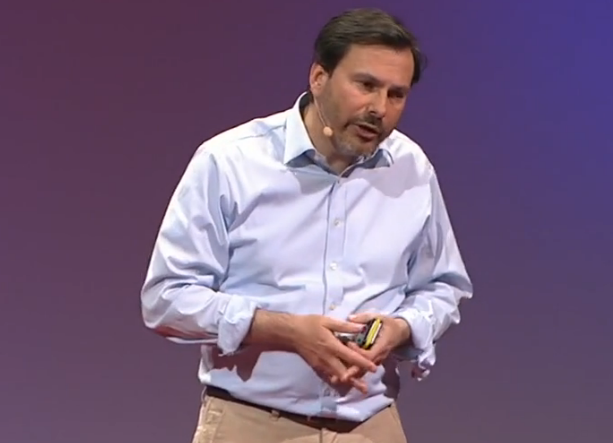And so you may say, well, given all of that, why then doesn't it work?
你可能說,就算這樣,為什么不奏效呢?
Why can we not make our politicians change? Why can't we demand them?
為什么我們無法讓政黨改變?為什么我們無法要求他們?
Well I, like a lot of us, spend a lot of time complaining about how hard it is to make people change,
我,就像我們中間許多人,花很多時間抱怨讓人改變有多困難,
and I don't think we should fuss about it.
我不認為我們應該對此小題大作。
I think we should just accept that we are an inherently conservative species.
我覺得我們應該接受我們是天生非常保守的種類。
We don't like to change. It exists for very sensible evolutionary reasons.
我們不喜歡改變。這種現狀的存在是因為非常合理的進化原因。
We probably wouldn't still be here today if we weren't so resistant to change.
如果我們不是如此頑固執守的話,我們今天很可能不會在這里。
It's very simple: Many thousands of years ago, we discovered that if we carried on doing the same things,
很簡單:幾千年前,我們發現如果我們繼續做同樣的事情,
we wouldn't die, because the things that we've done before by definition didn't kill us,
我們就死不了,因為我們以前所做的,肯定讓我們生存下去,
and therefore as long as we carry on doing them, we'll be okay,
所以只要我們繼續這么做,我們就沒事,
and it's very sensible not to do anything new, because it might kill you.
不去嘗試新事物是很合理的,因為新事物可能會殺了你。
But of course, there are exceptions to that. Otherwise, we'd never get anywhere.
但當然,也有例外。不然我們就無法前進。
And one of the exceptions, the interesting exception,
一個有趣的例外是
is when you can show to people that there might be some self-interest in them making that leap of faith and changing a little bit.
當你告訴別人滿懷信心,并做出一些改變是對他們自身有利的時候。
So I've spent a lot of the last 10 or 15 years trying to find out what could be that self-interest
所以我在過去的10到15年里試圖找到那個
that would encourage not just politicians but also businesses and general populations,
可以鼓勵不僅是政治家,也包括商家和大眾的自身利益是什么,
all of us, to start to think a little more outwardly, to think in a bigger picture,
我們所有人,開始一點點往遠看,想想大局,
not always to look inwards, sometimes to look outwards.
不要總是只顧自己,偶爾也向外(世界)看看。
And this is where I discovered something quite important.
這時我發現了一件相當重要的事。
In 2005, I launched a study called the Nation Brands Index.
2005年,我展開了一項稱為“國家品牌指數”的研究。

What it is, it's a very large-scale study that polls a very large sample of the world's population,
這是一個非常龐大的調查,它從世界人口范圍取出龐大樣品數據,
a sample that represents about 70 percent of the planet's population,
這個樣本代表了地球人口的70%,
and I started asking them a series of questions about how they perceive other countries.
我開始問他們一系列的問題,關于他們是如何看待自己國家的。
And the Nation Brands Index over the years has grown to be a very, very large database.
多年來國家品牌指數變成了一個非常非常龐大的數據庫。
It's about 200 billion data points tracking what ordinary people think about other countries and why.
它具有大概兩千億數據點,記載了常人是如何看待他們國家的以及為什么。
Why did I do this? Well, because the governments that I advise are very, very keen on knowing how they are regarded.
為什么我要做這件事呢?因為我做顧問的政府非常非常想要知道他們是如何被看待的。
They've known, partly because I've encouraged them to realize it,
他們已經了解到,一半是出于我鼓勵他們來意識到,
that countries depend enormously on their reputations in order to survive and prosper in the world.
國家很大程度上取決于他們的聲譽來決定他們在世界中的生存及繁榮。
If a country has a great, positive image, like Germany has or Sweden or Switzerland,
如果一個國家有很偉大很正面的形象,像德國、瑞典或瑞士,
everything is easy and everything is cheap. You get more tourists.
所有事情就很容易而東西也會很便宜。你能得到游客。
You get more investors. You sell your products more expensively.
你能得到投資商。你可以高價賣出你的商品。
If, on the other hand, you have a country with a very weak or a very negative image,
另一方面,如果你的國家有一個非常弱或負面的形象,
everything is difficult and everything is expensive.
所有事情就變得困難而且東西昂貴。
So governments care desperately about the image of their country,
所以政府極度關注國家的形象。
because it makes a direct difference to how much money they can make,
因為它直接影響到他們能掙多少錢,
and that's what they've promised their populations they're going to deliver.
這也是他們向國民所承諾的他們將給予的。



